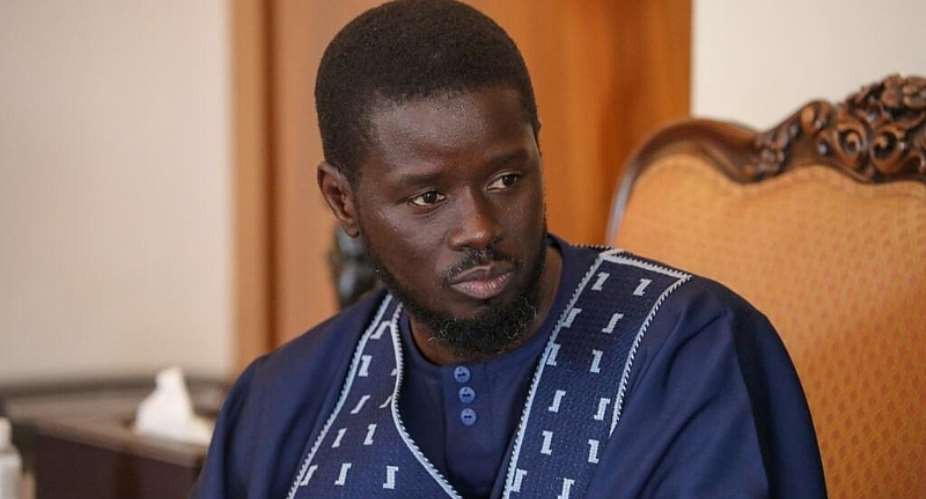Five days after Senegal's landmark presidential vote, elected leader Bassirou Diomaye Faye is getting ready for a swift transition – promising to overhaul the way the country is run.
Outgoing president Macky Sall held his last government meeting in the capital Dakar this week with both Faye and fellow opposition figure Ousmane Sonko.
Sall's last-minute postponement of the vote and the ensuing rushed electoral timetable had cast doubt over whether the handover could take place before the end of his term on 2 April.
A swift transfer of power in Senegal, described as a beacon of democracy in West Africa, would help build stability in the coup-hit region.
Faye and his team, formed from members of the Pastef party, say they're be ready for next week's handover, which is rumoured to happen the day Sall steps down.
The president-elect has said he will form his first government on 5 April – the day after Senegal celebrates its independence from France.
'Surprise' win
"Faye's victory took many by surprise," security analyst Babacar Ndiaye, from the Timbuktu Institute, told RFI. "The days after the election have been really peaceful so it's a success for democracy."
Faye's win largely came about because of people's anger against Sall's autocratic and oppressive drift, Ndiaye added.
Now he and Sonko must deliver the change they promised.
Having never held elected office, Faye is set to become the fifth president of Senegal, which has a population of around 18 million people.
On Monday he promised to restore national "sovereignty" and implement his programme of "leftwing pan-Africanism". He said he would prioritise national reconciliation, rebuilding institutions and reducing the cost of living.
Faye's presidency could herald a profound overhaul of Senegal's institutions.
He has spoken of reducing so-called "hyper-presidentialism" and of reintroducing the position of vice president. Some say that role might be offered to Sonko, his mentor and former Pastef party leader.
Faye has said he wants to slim down the government by getting rid of positions and institutions seen as useless, including the Social and Economic Council, and the High Council for Local Governments.
"This could save billions a year – money that could be used for programmes targeted at reducing inequality," Ndiaye said.
Faye's policies could also have regional impacts: he has promised a change in the monetary system, dropping the colonial CFA franc and switching to an Ecowas-led currency first, the "eco". If this doesn't come about, he'll introduce a national currency.
"This could change Senegal by addressing the needs of the people – especially the poorest and the weakest," Ndiaye said.
It also puts a lot of responsibility on the presidency.
"It's one thing to be popular, but another to deliver and show good management skills."





 Court dismisses Serwaa Amihere case against Henry Fitz, two others
Court dismisses Serwaa Amihere case against Henry Fitz, two others
 Stolen BRVs: Bi-partisan parliamentary probe non-negotiable — Dr. Omane Boamah
Stolen BRVs: Bi-partisan parliamentary probe non-negotiable — Dr. Omane Boamah
 Bawumia begins regional campaign tour on Monday
Bawumia begins regional campaign tour on Monday
 With great urgency backed by verifiable data, facts and figures dismiss COCOBOD,...
With great urgency backed by verifiable data, facts and figures dismiss COCOBOD,...
 EC’s statement on obsolete BVDs discovery “lies, half-truths, pure fantasies” – ...
EC’s statement on obsolete BVDs discovery “lies, half-truths, pure fantasies” – ...
 Nalerigu court impound vehicles of DCE, Director of Chereponi district for owing...
Nalerigu court impound vehicles of DCE, Director of Chereponi district for owing...
 Cop, 7 others grabbed over $523,000 Gold Scam
Cop, 7 others grabbed over $523,000 Gold Scam
 Akufo-Addo’s driver wins Dadekotopon NPP Parliamentary Primary
Akufo-Addo’s driver wins Dadekotopon NPP Parliamentary Primary
 Investigate, jail persons liable for GRA-SML contract – Manasseh
Investigate, jail persons liable for GRA-SML contract – Manasseh
 Lawyer wins Akan NPP Parliamentary Candidate primary
Lawyer wins Akan NPP Parliamentary Candidate primary
